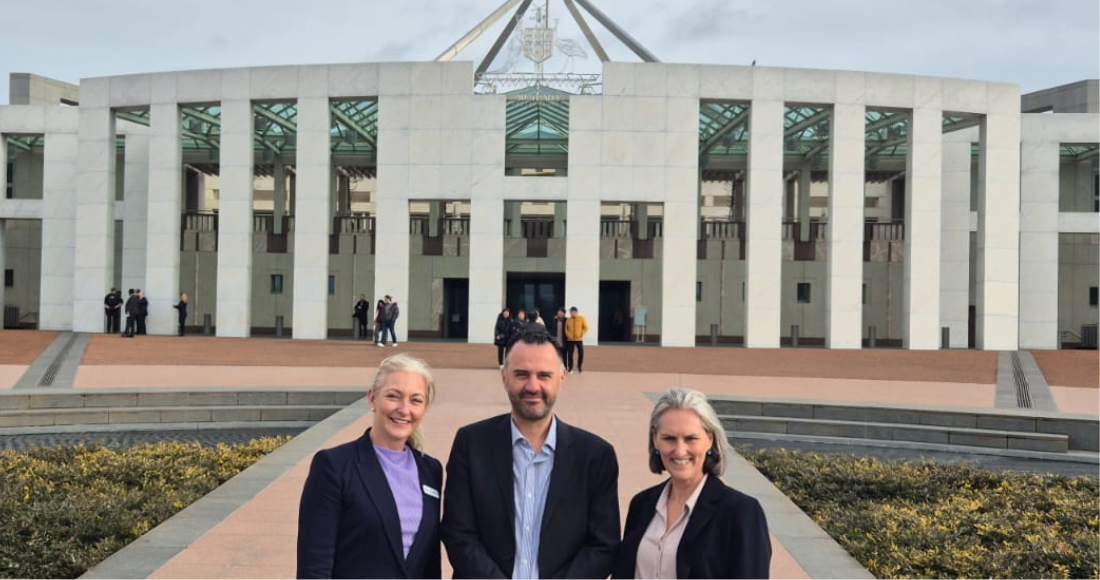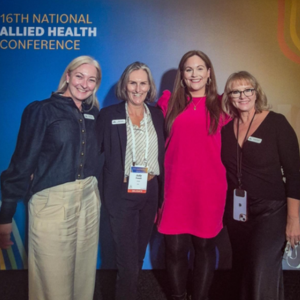APodA advocacy update: August 2025
26 Aug 2025

APodA on the front foot at the start of the 48th Parliament
The first sitting weeks of the new parliament are done and dusted and APodA was on the front foot. We travelled to Canberra to meet with our political leaders to advocate for positive policy change. This is an important part of the work we do, and we teamed up with the Australasian College of Podiatric Surgeons.
 Our team met with Dr Michael Freelander MP, Tania Lawrence MP, Assistant Minister the Hon Emma McBride MP, Assistant Minister for Health, the Hon Rebecca White, Senator Jordon Steele-John, Minister for Indigenous Australians, the Hon. Senator Malarndirri McCarthy as well as an advisor to the office of Assistant Minister for NDIS, Senator the Hon. Jenny McAllister and an advisor from the office of the Minister for Health, Aged Care and NDIS, the Hon Mark Butler MP.
Our team met with Dr Michael Freelander MP, Tania Lawrence MP, Assistant Minister the Hon Emma McBride MP, Assistant Minister for Health, the Hon Rebecca White, Senator Jordon Steele-John, Minister for Indigenous Australians, the Hon. Senator Malarndirri McCarthy as well as an advisor to the office of Assistant Minister for NDIS, Senator the Hon. Jenny McAllister and an advisor from the office of the Minister for Health, Aged Care and NDIS, the Hon Mark Butler MP.
We talked about the need for Australians to be able to access services to optimise their health and independence, advocating on two key policy areas:
- NDIS: Better access to podiatry therapy support for people with disabilities to ensure they have the best opportunity to be mobile and maintain independence.
- Pharmaceutical Benefits Scheme (PBS): To enable people to access the PBS when they have scheduled medicines prescribed by podiatrists or podiatric surgeons.
Since this trip to Canberra the team has also met with an Advisor in the Office of Senator Anne Ruston. She is the Opposition Spokesperson for Health and Aged Care.
We are encouraged by the interest in podiatry and the willingness of these decision makers to continue a dialogue to improve access to podiatric services for the Australian community.
APodA at the National Allied Health Conference
APodA attended the National Allied Health Conference in Adelaide recently. The theme of the conference was ‘Empowering lives, shaping healthcare’ and it didn’t disappoint with inspiring key note speakers, over 300 presentations and lots of opportunities to network.
 The first plenary session included presentations from Chief Allied Health Officers from both New Zealand and Australia as well as the Australian Rural Health Commissioner. The pace of reform for allied health is unprecedented with new strategies on the horizon, and digital health set to increase interoperability.
The first plenary session included presentations from Chief Allied Health Officers from both New Zealand and Australia as well as the Australian Rural Health Commissioner. The pace of reform for allied health is unprecedented with new strategies on the horizon, and digital health set to increase interoperability.
The APodA team were pleased to see a great presence from the podiatry community with active engagement through delivery of oral presentations and posters. During the networking we got to meet with Chief Allied Health Officers across Australia and with a variety of key stakeholders such as Primary Health Networks (PHNs). PHNs have recently employed staff to connect with allied health.
Look out for our PHN website page to find out how you can get better connected with your PHN.
Disability and the NDIS
It’s been a busy period at APodA as we focus on all things NDIS.
We continue to actively advocate for our members' concerns, following our recent trip to Canberra where we met with Ministers, Senators, and advisors. Through the Allied Health Practitioner Association (AHPA), we’ve joined forces with other allied health professionals to raise our concerns and maintain regular engagement with the NDIA.
A big thank you to all our members who completed the NDIS Survey. The results revealed an overwhelming commitment to supporting NDIS participants, with many podiatrists feeling frustrated, undervalued and financially strained under the current system.
Your responses—and the case studies you’ve shared—have been invaluable in highlighting the challenges podiatrists face within the NDIS space.
We will share these case studies highlighting the real-life impact podiatry has on NDIS participants—like Jane, whose story is outlined below.
👣 How NDIS-funded podiatry changed Jane’s life
Jane, 53, lives with an intellectual disability and autism. She’s non-verbal, experiences sensory challenges, and communicates through hand gestures. Medical clinics cause her significant anxiety—especially unfamiliar environments, loud noises, and waiting rooms. Jane refused seeing the podiatrist in the clinic through the Medical Benefits Scheme due to these issues.
Her toenails became overgrown, painful and infected and Jane stopped wearing shoes. This led to her being unable to attend her day program, isolating her from her community.
But everything changed when podiatry was funded through the NDIS.
- 🏡 Home visits were introduced.
- 🧩 Sessions were flexible and tailored to her individual sensory needs.
- 👟 Jane began wearing shoes again, and returned to her day program.
NDIS-funded podiatry gave Jane more than foot care. It gave her comfort, inclusion and connection.
Click here to find out more about Jane and her story >>
Get involved
We encourage you all to continue to be involved. Our dedicated NDIS advocacy page provides an opportunity for you to get involved and support collective action.
Primary Care & Chronic Disease Management Plans
Share your experiences on the 1 July Chronic Conditions Management Plan changes.
Since 1 July, the recent changes to Chronic Conditions Management (CCM) previously Chronic Disease Management Plans, referrals under the MBS have continued to generate uncertainty across the podiatry community. We’ve been actively raising questions with the Commonwealth on how the new rules apply in practice and how payments are being managed.
To assist members, APodA has developed a letter template you can use with your referring GPs that is accessible here.
The APodA advocacy team met with the Department to talk about a webinar for members and shared our issues. They are now engaging with Allied Health Professions Australia to run this education opportunity for the whole allied health community and will incorporate the concerns from the podiatry community. We anticipate that this webinar will occur in September so stay tuned for details.
Now that the changes are in effect, we want to hear from you. Have you noticed any trends — operationally in your practice, or in how your patients are accessing and using CCM services? Your feedback will help us provide real-world examples to Government, highlight challenges, and advocate for practical solutions. Additionally, it would be great to receive some suggestions on some more resources that would assist in navigating this change.
Please share your experiences with the APodA advocacy team via advocacy@podiatry.org.au. You can also find more details in our updated CCM FAQs.
Digital health
The APodA continues to actively represent podiatry in AHPA’s Digital Health Working Group, ensuring that allied health digital capability-building reflects the needs of our profession.
Recently, we met with the Provider Connect Australia™ (PCA™) team to deepen our understanding of how PCA works and to strengthen our connections with the right people and organisations. This meeting reinforced our commitment to supporting podiatrists in adopting PCA as part of the broader digital health landscape.
About Provider Connect Australia™
PCA™ is an initiative of the Australian Digital Health Agency that enables healthcare provider organisations to update their business information in a single, secure location. This ensures accurate and consistent healthcare service and practitioner information is shared with funders, health service directories, communication services, and other key partners—reducing duplication and streamlining notifications.
For healthcare providers, PCA™ offer the future potential for less administrative overhead and more time to focus on patient care.
Learn more and join PCA: Provider Connect Australia™ here >>
Aged care
To support practitioners and businesses in preparing for the new Aged Care Act, the Department of Health, Disability and Ageing has released a suite of resources covering education and training, guidance on navigating the reforms, and support for provider operational readiness.
These resources are designed to help services adapt to upcoming changes and maintain high-quality care for older Australians. You can access them here, Preparing for the Aged Care Act.
Alongside this, consultation is now open on IHACPA’s Pricing Framework for Australian Residential Aged Care Services 2026–27.APodA will be preparing a submission to this consultation, with a focus on areas that remain unaddressed in the current framework, including:
- Podiatry-specific costs not being captured in pricing approaches.
- Limited recognition of podiatry’s role in reablement and functional maintenance.
- The absence of costings for mobile and outreach service models.
- No visibility of podiatry in thin market programs or Aboriginal and Torres Strait Islander service models.
- Increased clinical risk when podiatry is excluded.
Our aim is to ensure the scope and true value of podiatry services are understood and appropriately funded. We will continue advocating for the critical role podiatry plays in residential aged care—supporting mobility, preventing falls, and reducing the risk of hospitalisation.
Pricing in Aged Care will continue to be scrutinised over the next 12 months and it will be important to include the entire cost of your service. Check out the pricing calculator (APodA members only) which has been designed to assist in pricing setting for your service.
A link to APodA's pricing calculator can be found here >>
Department of Veteran Affairs
APodA attended the quarterly Department of Veterans’ Affairs (DVA) Health Providers Partnership Forum meeting where the following updates were given:
- The government provided a response to the Royal Commission’s final report in December 2024. The response acknowledges the need to consider veteran health care pricing and system design relating to Recommendation 71.
- DVA requested input to determine the main issues and barriers to Providers determining eligibility themselves, in response to increasing queries to DVA regarding eligibility for health treatments.
- DVA sought feedback on two newly created allied health quick guides: Allied Health Treatment Cycle, Rehabilitation Appliances Program and also sought topic suggestions for allied health topic areas to inform future education resources as part of VETs HeLP.
We consulted with the Podiatrists in Aged Care (PAC) Special Interest Group (SIG) and other key members to review the draft DVA Allied Health Quick Guides.
Our focus was on making sure these guides offer clear, practical advice that supports podiatrists in delivering quality care to veterans.
